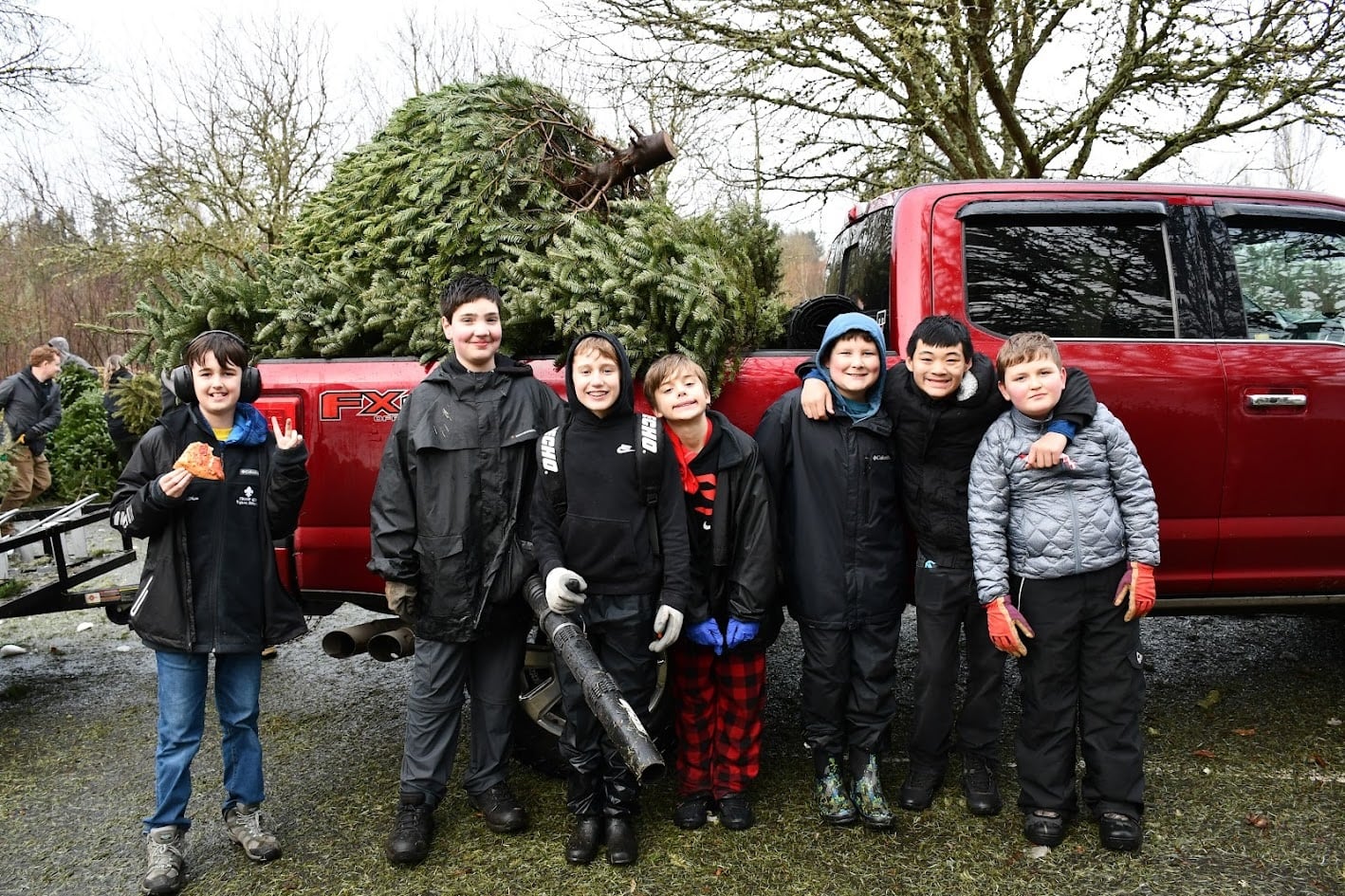One advantage of purchasing an Oregon-grown Christmas tree or getting a U.S. Forest Service permit to cut down a live fir tree is that the natural foliage can be used for other purposes.
A genuine Christmas tree can be turned into mulch to help retain water and nutrients in a yard or used to create a year-round animal habitat with a bird feeder hanging from a branch after it has been cleared of nonorganic objects.
Environmental organizations gather fallen trees to strategically bury in waterways for wetland restoration projects and to shield steelhead and salmon from predators.
For a $15 donation, the Tigard BSA Scout Troop will pick up non-flocked trees from driveways or pick them up at Cook Park.423 scout troops
Scout troops and other charitable organizations gather biodegradable Christmas trees and wreaths from driveways or at specific collection locations in exchange for a nominal donation.
For use as ground cover in parks, trees stripped of lights, ornaments, tinsel, wire, spikes, nails, supports, plastic, and other non-plant materials are diverted from landfills.
At Cook Park, located at 17005 Southwest 92nd Ave. in Tigard, BSA Scout Troop 423 gathers non-flocked trees and foliage to be chipped and put on trails with assistance from Evergreen Tree Services.
In addition to supporting Scout-led programs that cultivate a love of the outdoors and teach perseverance, teamwork, and a dedication to service, the endeavor contributes to a healthy, thriving park ecosystem. According to KP Phoebus, parent leader of BSA Troop 423, every donation makes a difference.
For a suggested payment of $15, Troop 423 (previously Troops 423 and 218) provides holiday tree pickup in parts of ZIP codes 97224, 97223, and 97007; drop-off services are available at Cook Park from 9 a.m. to 4 p.m. on December 29, January 4, 5, 11, or 12. Visit bsatroop423and218.org to arrange a pickup.
Visit beascout.scouting.org to locate Oregon Scout troops.
Repurposing only trees grown in Oregon is encouraged by the Oregon Department of Forestry. Some retailers sell non-native Christmas trees that may be infested with invasive pests.
If you think an out-of-state Christmas tree may have bugs, call the forest department, cut it up, and put it in a sealed garbage can with plastic bags. They advised against dumping it in a park or forest or leaving it in the backyard for an extended amount of time.
As long as the greenery fits within the bin and is picked up on the regularly scheduled pick-up day, garbage collection agencies will accept trees as recyclable yard debris. It is possible to chop up a big tree, put the debris in the trash can, and have it cleaned up over a few weeks. For the additional trash, there can be a cost. Flocked trees are not accepted by all shippers.
To find the nearest yard waste recycling center or seasonal tree recycling event, use Metro’s Find-A-Recycler. Ask a query, give 503-234-3000 a call, or get in touch with local garbage hauler.
Repurpose a tree
You can re-decorate an old Christmas tree and put it outside to use as a bird feeder.
These ideas for making excellent use of a post-Christmas tree grown in Oregon are provided by Organic Gardening and others for do-it-yourselfers:
Create mulch: To protect plant roots from the cold, trim off the branches and wrap them around the plants. Additionally, decomposing wood releases minerals into the soil, such as carbon, nitrogen, potassium, and phosphorus, which can enhance plant development and soil quality. Additionally, wood chips can be used to control weeds and fill in garden walkways.
Make a compost pile better: Bend blogger Linda Lyof yard Betty advises chopping the tree into smaller parts and leaving the pile until the branches are dry and brittle and the pine needles have fallen off. Then, if necessary, utilize these brown materials as a source of carbon for your compost pile, she advised.
Benefit wildlife: Overwinter the tree on its stand outside so that it can offer wild birds food and cover. From the branches, suspend a suet cage or bird feeder. According to Ly, putting branches in a chicken run is a wonderful approach to assist poultry get over their winter boredom because goats enjoy eating trees.
A fish home: You can create habitats for fish and aquatic invertebrates by putting your tree in a deep pond with the owner’s consent. Trees can prevent soil and sand erosion in shallow wetlands.
Make it a trellis: In the spring, move the tree to a corner of your yard and use it as a pea or bean trellis in your garden.
Janet Eastman writes on trends and design. You can follow her on X@janeteastman and contact her at 503-294-4072 and jeastman@oregonian.com.
Note: Every piece of content is rigorously reviewed by our team of experienced writers and editors to ensure its accuracy. Our writers use credible sources and adhere to strict fact-checking protocols to verify all claims and data before publication. If an error is identified, we promptly correct it and strive for transparency in all updates, feel free to reach out to us via email. We appreciate your trust and support!







